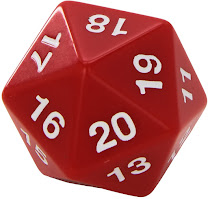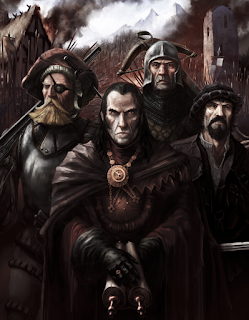With the publication of my first article, I was quickly reminded by several readers that skill checks, in fact, do exist in early editions of D&D. I'll clarify right here that my commentary on the increasing reliance on skill checks throughout subsequent editions refers specifically to the list of universal skill checks present in those games, where all characters have access to the same skills regardless of class or ability scores. That being said, now we're gonna dig into the origins of universal skill checks and whether or not you can throw them in the trash with your copy of Unearthed Arcana.
"So, let me get this straight: You want to sneak up behind the guard, silently break his neck without alerting his companions, and drag his corpse into the bushes so you can loot it? *sigh* Roll stealth I guess. Oh but with disadvantage since you're wearing plate mail."
- art by Jeff Easley -
Skill checks happened in early D&D when players attempted to influence events relying on their characters' particular strengths. Usually, when something was left up to chance, the DM would weigh the circumstances, decree there was an X/6 chance of success, and roll the d6. This on-the-fly ruling handled common player activities such as forcing doors open, listening, climbing walls, finding secret doors, surprising enemies, as well as being surprised by enemies. Occasionally, players would be asked to roll 3d6 against one of their ability scores, with a result equal to or less than the ability score in question meaning success (though I personally dislike this style of resolution). Yes, the mighty d6 was the WD-40 that kept every old-school engine running smoothly.
"Now I am become Death, destroyer of worlds!"
-Yahtzee players discovering B/X, probably
Some of these d6 rolls had their chances of success modified based on the PCs' ability scores, such as forcing doors going from a 2-in-6 chance to a 5-in-6 chance depending on the character's Strength score. Or player Charisma modifying the d6 roll for an NPC's first impression of them. Eventually, these frequently-used modified rolls found their home adjacent to the ability scores on the official character sheet, which relieved the DM of the burden of consistent rulings for such mundane situations. Door stuck? Roll your Open Doors check. Attempting to parley with some rivals in a dungeon? Roll against your Reaction Adjustment. I would venture to say that these aren't true skill checks, since they aren't consistently rolled for every situation that could call for them. A party that decides to approach the stuck door problem with a battering ram won't have to roll for a success. Holding a blade to your enemy's throat will all but guarantee the odds of surrender. The true basis for universal skill checks begins with our friend the Thief.
Sure, thieves can wear leather armor, but why wear anything at all when your chest is a giant Brillo pad?
- art by David A. Trampier -
Like most aspects of D&D, the thief was inspired by the work of Tolkien, and as long as there has been fantasy roleplaying, there has been the token burglar. Gygax's thief class shied away from combat, much like Bilbo, and as such was in need of additional skills to make the class interesting. What resulted is the array of much-debated thief skills: Open Locks, Find/Remove Traps, Pickpocket, Move Silently, Climb Sheer Surfaces, Hide In Shadows, and Hear Noise. More skills would be included once 1E rolled around, but these were always at the core of the class. Each skill was a percentile score for success that gradually rose with the thief's level. The rationale for the thief's unique ability to utilize these rolls is that he or she has been specially trained in these areas, and as such should be allowed to circumvent undue explanation and roleplaying to quickly resolve tests of such skill. It's not to say that other classes can't attempt these feats as well, but typically their odds will not fare as well as the thief's. Not to mention no other class improves their chances to succeed at thief skills as they increase in level.
The thief's unique advantages when it came to stealth and burglary were indispensable to the average dungeon-faring party, and quickly became a favorite for those who preferred discretion over valor. However, there were those who cried for "balance". Why shouldn't the Fighter be able to climb sheer surfaces, or pick locks, albeit to a lesser degree? Multiclassing and dual-classing were born, mingling thief skills with the features of the other core classes. The assassin and ranger emerged in 1E among the other core classes, both deadlier than the now-basic thief. By the time WotC rose to power with 3E, all characters, regardless of class, had access to an encyclopedic catalog of skills, including several colorful variants of the classic thief skills. The idea was that anybody could roll a d20 against any of these skills, while only the skills they were trained in gave any sort of meaningful bonus for the roll to succeed.
The advent of the d20 system marked the end of the old-school era. On the bright side, players who were new to roleplaying had a very accessible system at their disposal to resolve their in-game actions.
However, in the long run, this player aid has become more of a crutch, and the expectation for roleplaying has become 'describe the end result you wish to achieve, roll the relevant skill check, DM fills in the gaps to match the result of the die roll'. This is a fundamental shift from the original style of 'describe in detail what actions your character takes, DM describes the logical result of those actions, with a die roll if necessary'. I'm not going to pretend that these two styles of TTRPG gameplay encapsulate the experience at every table, or that one is superior to the other. The cardinal rule of gaming has always been 'Your table, your rules; make it fun for everybody'. But I'm also not going to pretend that the prominence of skill checks in the d20 system hasn't drastically changed the landscape of roleplaying within the last two decades.
Just look at that ego. Everyone thinks he's so great, and he knows it, too.
When all's said and done, I have no quarrel with skill checks, as long as there's a responsible DM nearby encouraging the players rolling them to engage with the game in fun and meaningful ways. But to truly experience the OSR, DMs and players alike must shrug off the chains of the d20 system and get creative with the roleplaying aspect of the game. The best solution to any challenge the PCs face is going to be one they come up with on their own, not the ones that can be found on the character sheet.






Comments
Post a Comment